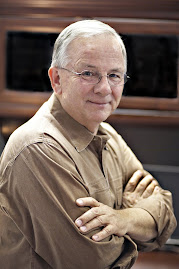
As a leader you are totally and dynamically reliant upon God and your fellow human beings for your well-being and continued existence. Nonetheless, you remain irreducibly distinctive, independent, and irreplaceable with even greater individual capacity, influence, and significance, finding the center of your existence and significance in God and others.
Lord of the Dance
Remember … the art of dancing holds the secret to effective leadership. Let me continue from last week …
There is a magnificent and transcendent picture of this kind of interdependence in the Godhead, the Holy Trinity. The early church fathers used the word perichoresis to describe the interdependent relationship of God the Father, God the Son, and God the Holy Spirit.
Interestingly, this word, perichoresis, is the root word for dance. Perichoresis speaks about a deep interpenetrating relationship, a mutual indwelling, and a reciprocal interrelationship between the members of the Holy Trinity. The Trinity is significantly more than three distinct people who learned how to get along simply because they attended a team-building seminar together. There is a mutual relationship that is so deep and so complete that each person is completely in the other two – yet without coalescence, without losing any individual distinctiveness.
God the Father becomes even more distinctive as He completely interpenetrates God the Son and God the Holy Spirit; God the Son becomes even more distinctive as He completely interpenetrates God the Father and God the Holy Spirit; and, God the Holy Spirit becomes even more distinctive as He completely interpenetrates God the Father and God the Son.
Teach Me How to Twirl and How to Move
Andrew Stephen Damick captured this perichoretic portrait so wonderfully in his poem, Perichoresis. Again, don’t tell Sarah, but these words make me want to join the dance:
Perichoresis
O elegant and gentle Leader of the dance,
we do not know the meaning of each step
nor how to rightly turn this way or hold this pose.
Each spinning step or angled movement's twist
does sometimes give us vertigo here where we stand;
this mystery of how the rhythm's pulse
and how the music's lilt are tuned to only You
has caught us up, and we are overwhelmed.
O grace-filled, grace-bestowing Leader of the dance,
please teach me how to twirl and how to move;
please teach me how the song pervades each dancer's form,
these dancers who have learned to dance with You
throughout the ages of the song, the holy song
You sang in ages past to Abraham,
to Isaac and to Jacob and his Hebrew seed:
Now sing to me and give me, too, this life.
O Leader of the dance, this perfect partnership
of Leader and of led, of God and man,
this Incarnation's holy dance we see in You,
You now invite us to accompany.
This awesome dance, a truly cosmic synergy,
the interpenetration of us men
with Deity -- with Trinity! -- the universe
beholds and stands amazed and bows its head.
O holy Leader of this cosmic circling dance,
the union of both man and God is here
and imaged in the holy mystery of life
conjoined, a woman and a man conjoined.
He takes Your role as gentle leader, she as Church,
she follows him, and he must die for her;
their dance together joins the dance eternal now,
and in that human dance we see our God.
O Holy Trinity, Your dance eternal now
descends on us and consecrates our own,
the revelation here as Body and as Blood;
herein we taste the God become a man,
and men become as gods as David prophesied.
The Trinitarian rhythm has become
our own, to guide our dance, to grasp our hands and lead
us in the dance of stillness perfectly. [i] What a magnificent picture of how you are to relate to others!
Did you catch the last line? The Trinitarian rhythm has become our own, to guide our dance, to grasp our hands and lead us in the dance of stillness perfectly. God created you in His image. As a bearer of His image, you, like each member of the Godhead, are interdependent. You were created with the capacity for a deep, mutual, interpenetrating, interdependent relationship with God and with others. You have been invited to the dance – even though you may not know how to dance. In this dance, you become even more distinctive in your responsibility to be a bearer of God’s image.
You are interdependent.
You are a leader.
This is the truth about leadership.
This is the Genesis Principle of Leadership.
Now go out and dance … lead!
[i] Damick, Andrew Stephen,
Perichoresis, 2004.










